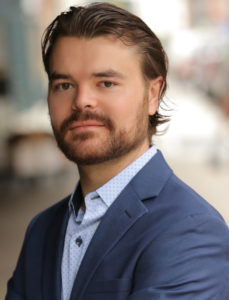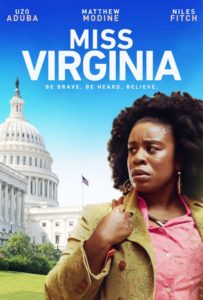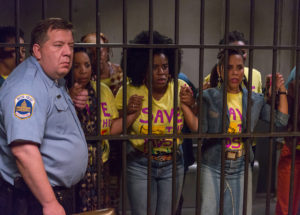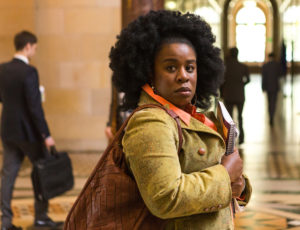Interview with Director R.J. Daniel Hanna of “Miss Virginia”
Written by: Hannah Tran | October 18th, 2019

I was recently delighted to sit down with director R.J. Daniel Hanna, whose inspirational debut film, Miss Virginia (which I also reviewed), is out on digital and on-demand and in select theatres on October 18th. Miss Virginia stars Orange Is the New Black actress Uzo Aduba and Full Metal Jacket star, Matthew Modine. It focuses on the true story of a mother’s struggle against Washington to create a scholarship program that will help give her son and other lower-income students in the Washington D.C. area a chance for a better education. Below is a transcript of that interview.

Hannah Tran: So you were born in Toronto and then moved to Arkansas and then went to USC and now live in LA. I was interested to hear if or how growing up sort of all over the map influenced you as a filmmaker.
R.J. Daniel Hanna: Oh yeah, I think it probably did. My parents are from Ireland too. And after moving to L.A., I considered myself as sort of a southerner and it was like “oh yeah, I am a southerner,” but when I lived in the south I never thought of myself that way. I think it does always makes you a little more observant, like, you’re part of a community, but you’re always kind of observing it a little more like an outsider. So I think there’s definitely that feeling there.
HT: And I think you can see that through the types of characters that you’re portraying onscreen. So, what was it like making your first feature film? Did you face any challenges moving from shorts and commercials to a feature length film?
RJDH: The big one for me was just the pace of it. It’s more like a marathon. Like, when you’re doing a short you’re shooting the same number of setups every day, but you’re usually done in about three days, and so you can sort of run yourself ragged, and then you’re done. In this case, you run yourself ragged and then it’s Wednesday, and you’re like “oh man, I still have two more days of this.” So, keeping yourself going and planning five very difficult days and making it through those five very difficult days and barely having time to recoup before doing it again was the biggest challenge for me, just adjusting to the scope of it.
HT: So it’s about education, and I was just wondering how you joined the project and what attracted you the most to this story.
RJDH: I got onto the project through the writer. I had known the writer before, and she had gotten to know Virginia for a couple of years by the time I got involved. I was asked to read the script and give feedback and, over time, after talking about the direction I would go or the areas I felt would be difficult to work on, I eventually got asked to pitch and direct. What attracted me to it was that it captured Virginia’s personality and her struggle and her tenaciousness. I thought it was a story that was both very personal about a mother and her son but also contained a much bigger story about a community as a whole.
HT: Like you were saying, it’s based on a true story. What was it like to work with the real Virginia?
RJDH: It was great. Just like in the movie, she’s funny, she’s caring, and she’s a wonderful person. She was always available to answer our questions. But it was also nerve-wracking because you don’t want to tell someone’s story and have them feel like it isn’t them. It was a lot of pressure, but she’s really happy with the film, and we’ve been going to screenings and panel discussions together.
HT: And it’s a great character. What was it like getting into that headspace and working with the actress, Uzo Aduba, to create that rendition of her?
RJDH: The way I thought of it was that I always tried to go back to Virginia. And so, it was a lot of conversation with her and getting to know where she was in her life. For me, it is sort of easy to put myself in someone else’s shoes and understand them when you are imagining it. And Uzo also got to meet her in D.C. and see what she’s like as a person. And I almost wanted the movie to be a movie that she would go see, one that she would choose to watch. Like, if in an alternate reality she was not this person, but still Virginia, would she watch this and enjoy it?

HT: I like that. And I know you do documentary work as well, so I was curious to know if there were any other research processes you used when mapping this film out.
RJDH: Well, when I met Virginia she took me around to all the real places, and I also met a lot of the other parents, and so that informed it too as I got a feel of the community. From a documentary standpoint, I’ve done a lot of documentary editing, and that sort of influenced the movie more than any idea that we should be documenting some sort of reality when making the film. So much of it is about how you tell a big story in a really clear way and so often documentaries are telling the biggest stories because people can talk directly to you and provide backstory without necessarily having to show it like you would in a narrative film. In that sense, I feel that every moviemaking discipline really can help when directing.
HT: I’m sure you get asked this a lot, but what kind of casting process did you have for this film?
RJDH: We talked about Uzo early on, and we offered it to her before we had a casting director. We knew we needed a lead to raise money and that sort of thing. Then, we were looking for actors who would bring something to the table and do everything the character was doing but give it something special. Matthew Modine was offer-only, but we were intrigued by what he might bring to that character because we kind of knew he would make it his own, and he really did. I was always looking for who would come at it from a different angle to just make it a little more lively.
HT: So it seems like your career is focused on talking about and bringing about social change. And I was just wondering, what is the main thing you’d like people to take from Miss Virginia?
RJDH: I think what I would love for people to take away from Miss Virginiais that one person really can create a grassroots movement. Virginia always said it very well, but it is a movie for parents everywhere. I also think for any issue, it can start with one person and grow if people are passionate about it.
HT: And it sounds like you’re working a lot of different projects. Are there are any upcoming projects you can tell us about?
RJDH: This one’s going to sound very different. It’s just in the script phrase right now, but we’re going to pitch it and start meetings soon, but it does go back to the social issue aspect. We’re going to a horror movie now that is sort of in the Get Outmodel of social issue horror. It’s about a young girl and her brother who end up on Skid Row in L.A. where there’s a high homeless population in the U.S., and then there’s is a zombie outbreak, yet nobody notices because nobody really wants to look at or engage with the homeless. So it’s sort of a satirical look at the invisibility of the homeless crisis through the lens of horror.
HT: Sounds right up my alley! Again, thank you so much for making this film and for giving me this interview. Best of luck with all your future projects.
RJDH: Yeah absolutely! Thanks so much.

For information on where and how to view the film, visit its website.

